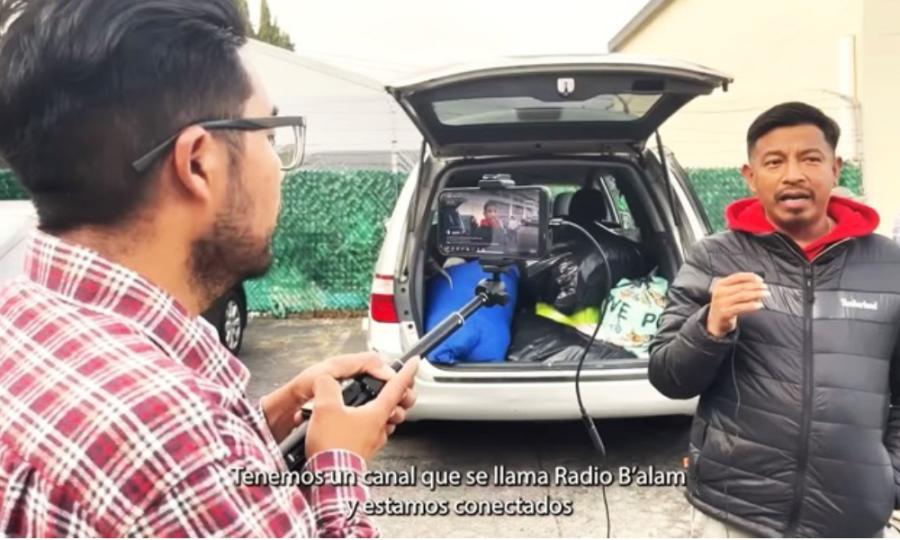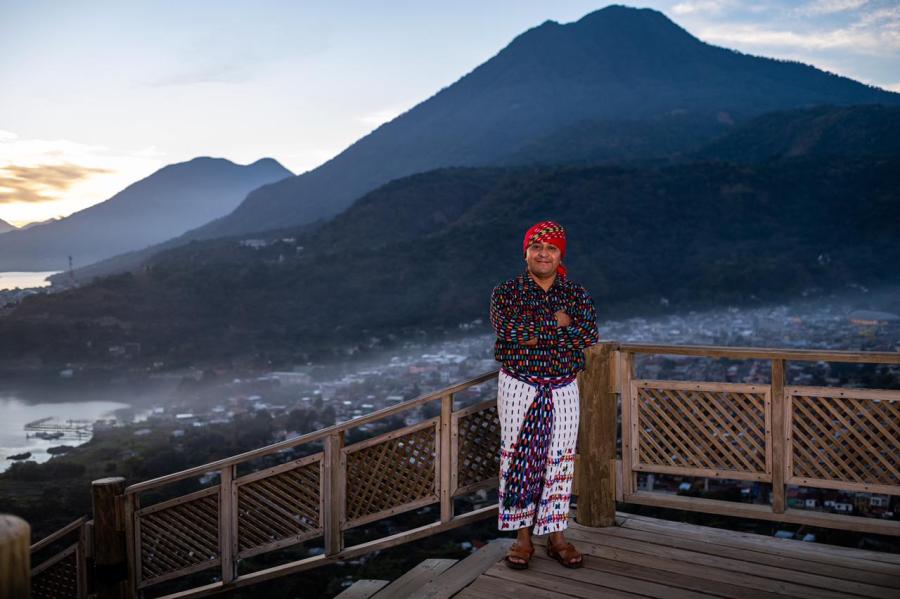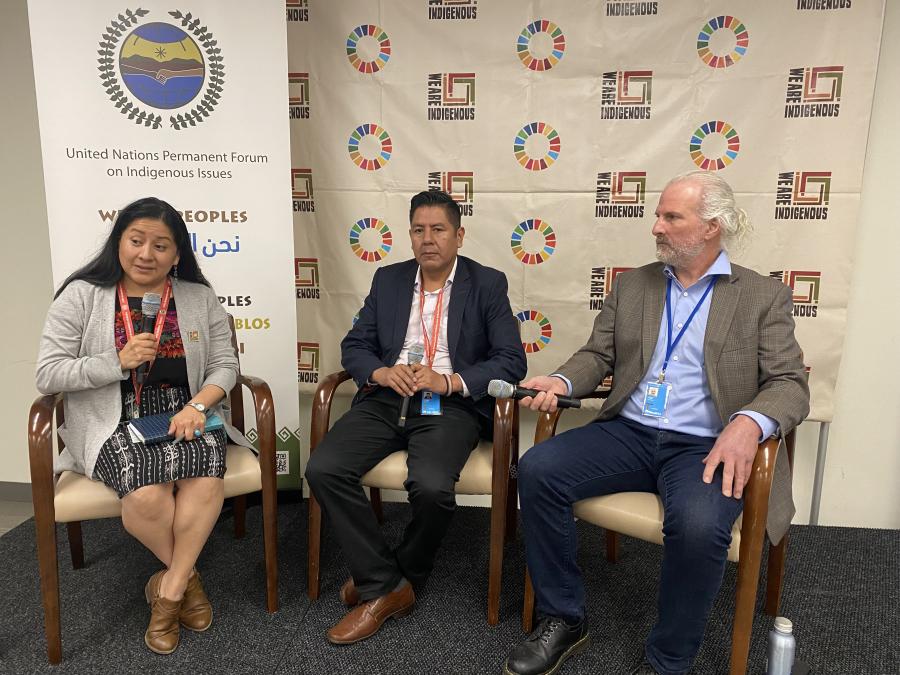Radio Doble Vía (Two Way Street) in the town of San Mateo, Quetzaltenango, Guatemala is one of the 85 locally owned and community-run radio stations which partners with Cultural Survival’s Community Radio Program. The work of this alternative form of communication is based on the promotion of values pertaining to the various Indigenous cultures that exist in Guatemala, as well as exercising one’s right to freedom of expression.
Throughout the course of eight years, Doble Vía has come to serve the communication needs of the whole San Mateo community from youth to adults, Indigenous and non-Indigenous. The station has no ties to partisan or sectarian politics; according to their mission statement, everyone has the same rights to express their ideas, dreams, and hopes.
Doble Vía is a community radio station that fosters the development of alternative social media in the pursuit of sustainable development and in building a more just and democratic society. It particularly serves the marginalized sectors of the San Mateo community whose values and needs are not represented in the mainstream ladino media.
VISION
To build a community radio system whose priority is human development. We hope to do so by providing members of the community with the technical tools and technologies available to produce creative radio programs that entertain listeners and present a variety of ideas, and to encourage conservation of the environment in which we live.
MISSION
To serve as a tool to help members of society express themselves freely. To be a place that promotes consensus, tolerance, dialogue, understanding, and cooperation among different sectors of the municipality.
WHY Doble Vía?
Alternative communication in the community must be a two-way street, where the listener is the subject and no longer the object. Civic participation plays a very important part in this.
A Typical Day in the Life of Doble Vía
5:30–7:30 AM
Freddy Escobar hosts the show Buenos Días (Good Morning) to the music of the marimba and orchestra. The marimba, a musical instrument similar to a xylophone, is extremely popular in Guatemala, and is recognized as the national instrument of the country. Today, Freddy discusses traditions and customs of San Mateo. Talking about traditional aspects of Indigenous culture over the radio helps reinforce and inform listeners about the importance of maintaining these traditions. Monday through Friday Freddy addresses social issues ranging from child abuse and alcoholism to environmental pollution. The variety of topics discussed on this particular segment is representative of the even wider range of topics discussed by various community radio volunteers throughout the week.
7:00–9:00 AM
The next segment of the day is hosted by Fredy Socop. On Monday, Wednesday, and Friday, he plays music from orquestas chapinas. Chapin(a) is a slang term that Guatemalans use to describe themselves, thus “Chapinas orchestras” refers to orchestras typical of Guatemala. Throughout his time on the air, Fredy also addresses a range of subject matter, but today he is discussing a topic very significant in many Indigenous communities across the globe: mining and its impact.
9:00–11:00 AM
Yomara Paxtor—host during this time from Monday to Wednesday—addresses an extremely important cultural question: what is identity? She discusses this topic and others while playing a musical variety.
11:00 AM–1:00 PM
From Monday to Wednesday, Juana Hernández discusses civic participation and broadcasts marimba music. This segment reflects the importance of politics and the role political discussions play on these community radio stations. Not only does community radio reinforce and strengthen tradition, but they also encourage community participation.
1:00–2:00 PM
Luis Alvarado hosts Teclas Morenas, and for the next hour speaks about children’s rights. Given the general history of discrimination against and marginalization of Indigenous Peoples in Guatemala, discussions about human and civil rights on community radio is very common.
2:00–3:00 PM
A second program hosted by Luis—Dosis Grupero—follows Teclas Morenas. In this segment, Luis discusses “sexuality with responsibility.” Public health messages are also common throughout the programming content, including educational information about reproductive health. In other programs, community radio volunteers address topics like obesity, drug, alcohol, and nicotine addiction,and sexually transmitted diseases. These discourses allow volunteers to inform the public about prominent health issues and provide support in dealing with such issues.
3:00–5:00 PM
Pascual Domínguez discusses deforestation on Tardes Románticas (Romantic Afternoons). He hosts this program Monday through Thursday addressing issues facing the environment including conservation and threats posed by extractive industries, while playing romantic music.
5:00–7:00 PM
Reina López plays a variety of music while discussing causes of armed conflict. Given the hostile nature of international relations, it is necessary to address these issues in a public forum.
7:00–9:00 PM
This is the last program of the night, and the one that boasts the most musical variety throughout the week. On Wednesday, Alex Chojolan hosts Vía Clásica (The Classic Way), where he plays classic rock. Here, Doble Vía provides space for radio guests, including a teachers and health promoters. A few other nights a week, Doble Vía broadcasts religious programming, evangelical, Catholic, and Mayan spirituality programs and music. The incorporation of various religious programs is representative of the cultural diversity present in Guatemala. These community radio stations do not look to exclude programming content not directly related to the Indigenous population; they embrace the cultural reality of Guatemala.
-- Hope Ross is an intern at Cultural Survival



